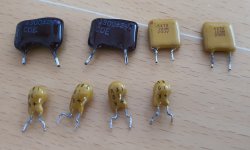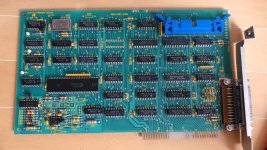Dallas_Green
Experienced Member
Hello community
I'm currently restaurating my old Compaq Portable and it turned out that almost all parts had defects. So I could already fix the PSU, CRT, floppy drive and recently the PCB with lot of help from you guys. Thanks again for this.
The next step is to get the old guy booting. What it shows is just "Diskette error, ...". I already cleaned, re-lubricated and verified the disk drive itself, the cables and disk content on my AT computer. There my dos 2.12 is booting from the drive and promting for Date/time as it should. So I suppose that it has something to do with the old floppy controller from the Portable. If I put it in the AT, at least you can hear the heads moving while posting (this kind of init seek) but it can't read anything from there. Just with my AT floppy controller it works. Guess this is also because the XT floppy controller is not supposed to work on an AT like @modem7 recently explained to my regarding the MFM controllers, that AT and XT controller are different animals. =)
Anyway I think that the controller is somehow bad. Also when I execute the diagnostic BIOS there is also a check for floppy read which always fails, doesn't matter which disk I insert.
So my first attempt was to desolder all the polarized capacitors and check on them. All are still working and have the foreseen capacity (+/-). I'm going to replace them anyway but until I got the new ones I can be sure that they are not the issue.
Are you guys typically replacing all the capacitors, also the ceramic ones when you recap your machines? Then there would be lot of work left on this card....
Does anyone has another idea how to check on the controller?
Thanks in advance
Dallas
I'm currently restaurating my old Compaq Portable and it turned out that almost all parts had defects. So I could already fix the PSU, CRT, floppy drive and recently the PCB with lot of help from you guys. Thanks again for this.
The next step is to get the old guy booting. What it shows is just "Diskette error, ...". I already cleaned, re-lubricated and verified the disk drive itself, the cables and disk content on my AT computer. There my dos 2.12 is booting from the drive and promting for Date/time as it should. So I suppose that it has something to do with the old floppy controller from the Portable. If I put it in the AT, at least you can hear the heads moving while posting (this kind of init seek) but it can't read anything from there. Just with my AT floppy controller it works. Guess this is also because the XT floppy controller is not supposed to work on an AT like @modem7 recently explained to my regarding the MFM controllers, that AT and XT controller are different animals. =)
Anyway I think that the controller is somehow bad. Also when I execute the diagnostic BIOS there is also a check for floppy read which always fails, doesn't matter which disk I insert.
So my first attempt was to desolder all the polarized capacitors and check on them. All are still working and have the foreseen capacity (+/-). I'm going to replace them anyway but until I got the new ones I can be sure that they are not the issue.
Are you guys typically replacing all the capacitors, also the ceramic ones when you recap your machines? Then there would be lot of work left on this card....
Does anyone has another idea how to check on the controller?
Thanks in advance
Dallas


